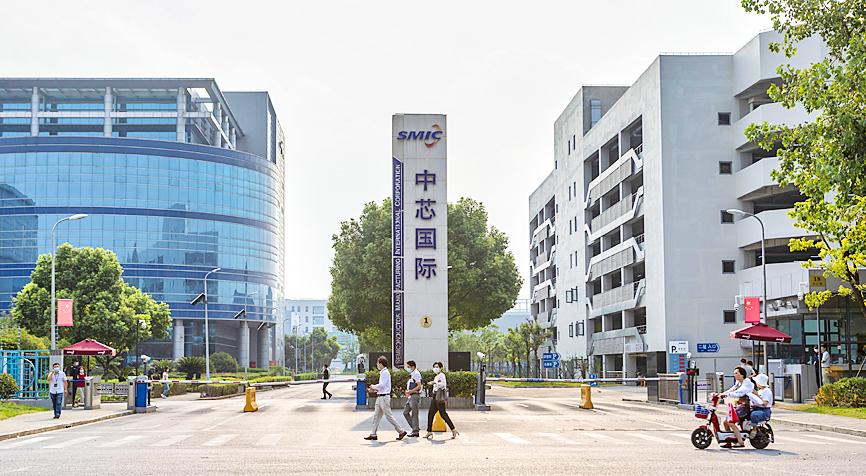Semiconductor Manufacturing International Corp (SMIC, 中芯國際) shares plunged almost 10 percent after news emerged about the surprise resignation of a top executive who spearheaded the rapid technological ascent of China’s largest chipmaker.
SMIC is trying to reach co-CEO Liang Mong-song (梁孟松) after online media circulated a resignation letter they said originated with the industry veteran.
Liang quit after SMIC appointed a vice chairman without consulting him, reports said.

Photo: EPA-EFE
The company is attempting to clarify his intentions, it said in an exchange filing without elaborating. Liang could not immediately be reached for comment.
SMIC shares tanked more than 9.7 percent in Shanghai and Hong Kong, underscoring the executive’s pivotal role within a state-backed national champion trying to navigate a volatile US-Chinese relationship.
Liang handed in his resignation after learning about the appointment of Chiang Shang-yi (蔣尚義) — a former senior executive at larger rival Taiwan Semiconductor Manufacturing Co (TSMC, 台積電) — to the board, media including Digitimes reported.
Liang, a fellow TSMC alumnus, was considered integral to SMIC’s efforts to become a major player in the business of fabricating chips for global giants.
SMIC has long relied on a cohort of Taiwanese executives — including Liang — to narrow the gap with TSMC and Samsung Electronics Co.
“SMIC’s recent technology progress was directly attributable to Liang,” Sanford C. Bernstein & Co analysts including Mark Li wrote. “Though the addition of Chiang is a positive, as the vice chairman his role is advisory. Liang, however, has been personally leading SMIC’s technology development and his contribution directly resulted in the mass production of 14nm [nanometers], for example. Considering them both, we believe Liang’s departure will have a bigger effect, and SMIC’s future technology progress may see a setback.”
Liang was instrumental in leading a 2,000-strong engineering team and helping SMIC migrate to cutting-edge 7nm process technology, slated to go into production in April.
It is unclear if his exit was directly linked to the appointment of Chiang, who left SMIC’s board last year to take charge of another signature Chinese project, memory chipmaker Wuhan Hongxin Semiconductor Co (武漢弘芯).
That company has since been taken over by the Hubei Provincial Government after encountering funding shortages.
SMIC, in contrast, has about doubled its market value this year, despite the risk of US sanctions, aided by a mega sale of stock in Shanghai and, more broadly, ballooning demand for chips as China’s economy emerges from the COVID-19 pandemic.
The Shanghai-based firm, a supplier to Qualcomm Inc and Broadcom Inc, lies at the heart of Beijing’s intention to build a world-class semiconductor industry and wean itself off a reliance on US technology.
It is backed by the China Integrated Circuit Industry Investment Fund (國家集成電路產業投資基金), as well as Singapore’s sovereign fund GIC Pte and the Abu Dhabi Investment Authority.
“Being a national champion with huge governmental investments, SMIC inevitably has some considerations that professional managers may not share,” Bernstein wrote. “Building a team that collaborates together toward a common goal is essential, but is something that money alone can’t buy.”

With this year’s Semicon Taiwan trade show set to kick off on Wednesday, market attention has turned to the mass production of advanced packaging technologies and capacity expansion in Taiwan and the US. With traditional scaling reaching physical limits, heterogeneous integration and packaging technologies have emerged as key solutions. Surging demand for artificial intelligence (AI), high-performance computing (HPC) and high-bandwidth memory (HBM) chips has put technologies such as chip-on-wafer-on-substrate (CoWoS), integrated fan-out (InFO), system on integrated chips (SoIC), 3D IC and fan-out panel-level packaging (FOPLP) at the center of semiconductor innovation, making them a major focus at this year’s trade show, according

DEBUT: The trade show is to feature 17 national pavilions, a new high for the event, including from Canada, Costa Rica, Lithuania, Sweden and Vietnam for the first time The Semicon Taiwan trade show, which opens on Wednesday, is expected to see a new high in the number of exhibitors and visitors from around the world, said its organizer, SEMI, which has described the annual event as the “Olympics of the semiconductor industry.” SEMI, which represents companies in the electronics manufacturing and design supply chain, and touts the annual exhibition as the most influential semiconductor trade show in the world, said more than 1,200 enterprises from 56 countries are to showcase their innovations across more than 4,100 booths, and that the event could attract 100,000 visitors. This year’s event features 17

EXPORT GROWTH: The AI boom has shortened chip cycles to just one year, putting pressure on chipmakers to accelerate development and expand packaging capacity Developing a localized supply chain for advanced packaging equipment is critical for keeping pace with customers’ increasingly shrinking time-to-market cycles for new artificial intelligence (AI) chips, Taiwan Semiconductor Manufacturing Co (TSMC, 台積電) said yesterday. Spurred on by the AI revolution, customers are accelerating product upgrades to nearly every year, compared with the two to three-year development cadence in the past, TSMC vice president of advanced packaging technology and service Jun He (何軍) said at a 3D IC Global Summit organized by SEMI in Taipei. These shortened cycles put heavy pressure on chipmakers, as the entire process — from chip design to mass

Germany is to establish its first-ever national pavilion at Semicon Taiwan, which starts tomorrow in Taipei, as the country looks to raise its profile and deepen semiconductor ties with Taiwan as global chip demand accelerates. Martin Mayer, a semiconductor investment expert at Germany Trade & Invest (GTAI), Germany’s international economic promotion agency, said before leaving for Taiwan that the nation is a crucial partner in developing Germany’s semiconductor ecosystem. Germany’s debut at the international semiconductor exhibition in Taipei aims to “show presence” and signal its commitment to semiconductors, while building trust with Taiwanese companies, government and industry associations, he said. “The best outcome